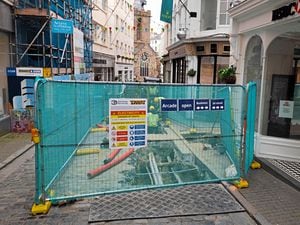OPINION: Party time
Look at the problems facing the island and it’s clear the present political system – with or without island-wide voting – isn’t working. That’s why Richard Digard says he’s a reluctant convert to political parties

A RANDOM remark on Twitter last week made me think. ‘Our current system of government doesn’t call for a leader,’ the poster said in a statement so seemingly counter-intuitive it warranted further inquiry. And as a result, what I can tell you is this.
Yes, we have a Policy & Resources Committee that is mandated to lead, and that committee has a president. But the 1,300-word document setting out its constitution, duties and powers, responsibilities and operational functions is silent on what that president should actually do.
In other words, being chief minister of Guernsey isn’t much of a job. Or, to take a slightly softer approach, can readily be adapted to suit the incumbent. Gavin St Pier tried, with some success, to direct from the front. But States members don’t much like being led, so when they had the chance they replaced him with Peter Ferbrache.
In turn, he was great at heading up the medics and experts during the pandemic and running the Civil Contingency Authority, but now seems happier taking a less front-foot role in this post-plague period and letting his colleagues get on with things.
Presidential style will matter again in 2025, after the next general election, when social media wisdom has it that the race for chief minister will be between Heidi Soulsby and Andrea Dudley-Owen – one being noted for wanting to identify and tackle issues, the other for keeping her head down and appearing blameless.
Before you start asking whether there’s a point to this, there is. A quick trawl through what Policy & Resources is supposed to be doing shows how badly it’s performing. Now and in the past. Unchallenged, unscrutinised, successive P&Rs have been failing on multiple fronts.
As a couple of examples, we have ‘leadership and co-ordination of the work of the States’, ‘requiring, and monitoring, the implementation of extant States resolutions’, ‘initiating reviews in areas where it appears that performance could be improved’, and (especially topical) ‘the policy framework for the regulation of financial services’.
I don’t have space to unpick each of those but a couple of things should readily be apparent. P&R was created to have an active and interventionist role in leading the States and so having discharged that role poorly over the years has inevitably resulted in some of today’s issues.
Those include – but aren’t limited to – States’ expenditure rising faster than economic growth (hence the need for tax rises), an inability to spend meaningfully on infrastructure projects (as identified by ratings agency Standard and Poor’s) and islanders generally becoming poorer (median earnings have fallen by 1.4% in real terms in the 12 months to December 2022).
Put simply, this means government spending is out of control, it has no concept of how to grow the economy to fund essential services or any intention of trying to make its citizens better off.
Each of these alone is significant. Together, they’re a looming disaster and, you’d think, a rallying call for the island’s finest minds to come together to resolve what, if left unchecked, is an existential threat to Guernsey’s future.
Instead, P&R has given committees a month to find £16m.-worth of savings. Any other organisation would be shedding staff or – given the crises in healthcare and housing – transferring resources to where they’re needed rather than asking departments to shake out a bit of loose change (total States spending this year will be more than half a billion and wage costs alone are more than £264m.).
Please note that P&R specifically has the job of acting as the States employer, so it alone can control payroll costs and headcount. It is also tasked with ensuring that public funds and other resources are used to best advantage. That includes through cooperative and flexible working practices while its headline duty is to ‘co-ordinate policy… the allocation and management of resources… and facilitating cross-committee policy development.’
On paper, then, it couldn’t be clearer what P&R should be – but isn’t – doing. Equally clear is how badly previous P&Rs have failed to discharge that duty. Current Treasury lead Mark Helyar himself highlighted some of this in his prescient ‘Jurassic States’ letter two years ago.
In it he said: ‘…our system of government allows every committee and their staff to do largely as they wish without any visibility or accountability to members of the Assembly, P&R, any other committee, or the public.’
That same system also meant that reduction of staffing cost was, unsurprisingly, cumbersome, lengthy, unionised and very expensive in comparison with the private sector, he said.
Confirming what I’ve outlined here, Deputy Helyar also stated: ‘It is P&R’s primary role to budget, lead and coordinate and it cannot fulfil that role in a governmental system which permits financial anarchy for which our children and grandchildren will be paying the bill.’
What he meant by that is while past and present P&Rs are mandated to lead, coordinate and generally get the States to operate in a prudent and sensible fashion, that can only happen if the States itself agrees – which, by and large, it won’t.
All of which prompts a couple of questions. How can you blame an individual or a senior committee for a lack of leadership when they’re unable to exercise such authority? And who’s actually in charge when everybody in the House is?
Most, I think, recognise this isn’t a satisfactory position to be in, especially with the consensus system (in the sense of deputies genuinely wanting to work together to reach pragmatic solutions) having broken down. Equally, previous attempts to break the deadlock by flirting with executive government have failed.
Many, I’d also argue, recognise that without significant change and reform, the island will struggle to cope with its ageing population, demographic costs, loss of competitiveness, declining birthrate and brightest youngsters leaving because of housing costs.
But that can’t happen under an existing system predicated on more of the same but at higher cost, so something has to give. And that something, I’m now reluctant to say, is political parties. Reluctant, because I’m not a great believer in them emerging to cope with, say, the difficulties caused by island-wide voting.
Now, however, the issues to address are so significant and the States so unable to deal with them that another agency is required to do it. So yes, perhaps there is finally a need to organise and mobilise islanders who are worried for the future, can see how Guernsey must change and recognise that current structures are the problem not the solution.
Since the States we have isn’t working – and under the Helyar Definition can’t work – the only hope left is party politics mandating a new Assembly to force through the required reforms.
Finally, it’s time to party – but with only 24 months left to make it a good one.





